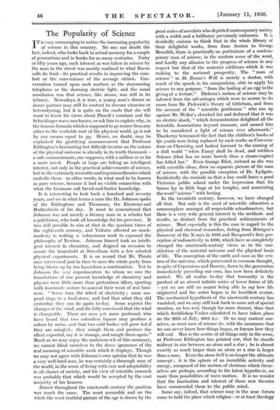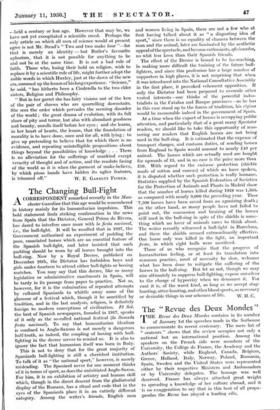The Popularity of Science
IT is very encouraging to notice the increasing popularity of science in this country. No one can doubt the fact, indeed, who looks back in actual memory for a couple of generations and in books for as many centuries. Forty or fifty years ago, such interest as was taken in science by the man in the street was mostly confined to what Bacon calls its fruit—its practical results in improving the com- fort or the convenience of the average citizen. Con- versation turned upon such matters as the stammering telephone or the dawning electric light, and the usual conclusion was that science, like steam, was still in its infancy. Nowadays, it is true, a young man's dinner or dance partner may still be content to discuss vitamins or heterodyning, but it is quite on the cards that she will want to know his views about Planck's constant and the Schrodinger wave-mechanics, or ask him to explain why, in the famous formula which is supposed to go nearer than any other to the veritable root of the physical world, qp is not by any means equal to pq. Hence, no doubt, may be explained the gratifying announcement. that Professor Eddington's fascinating but difficult treatise on the nature of the physical universe is already in its tenth thousand— a sale commensurate, one supposes, with a million or so for a mere novel. People at large are taking an intelligent interest, not only in the practical achievements of science, but in the extremely recondite and ingenious theories which underlie them—in other words, in what used to be known as pure science, because it had no visible connection with what the Germans call bread-and-butter knowledge.
It is interesting to look back a hundred and seventy years, and see in what terms a man like Dr. Johnson spoke of the Eddingtons and Thomsons, the Einsteins and Rutherfords of his day. It must be remembered that Johnson was not merely a literary man or a scholar but a polyhistor, who took all knowledge for his province. It was still possible to aim at that in the spacious times of the eighteenth century, and Voltaire affected no mock- modesty in writing a voluminous work to expound the philosophy of Newton. Johnson himself took an intelli- gent interest in chemistry, and deigned on occasion to amuse the household at Streatham with a few selected physical experiments. It is on record that Mr. Thrale once intervened just in time to save the whole party from being blown up by too hazardous a combination. Yet to Johnson the very experimenters to whom we owe the foundations of our present knowledge of chemistry and physics were little more than pretentious idlers, sporting with inanimate nature to conceal their want of real busi- ness. " Some turn the wheel of electricity ; some sus- pend rings to a load-stone, and find that what they did yesterday they can do again to-day. Some register the changes of the wind, and die fully convinced that the wind is changeable. There' are men yet more profound, who have heard that two colourless liquors may produce a colour by union, and that two cold bodies will grow hot if they are mingled ; they mingle them and produce the effect expected, say it is strange, and mingle them again." Much as we may enjoy the malicious wit of this summary, we cannot blind ourselves to the dense ignorance of the real meaning of scientific work which it displays. Though we may not agree with Johnson's own opinion that he was a very well-bred man, he was certainly a thorough man of the world, in the sense of living with ease and adaptability in all classes of society, and his view of scientific research was probably that which would be accepted by the vast majority of his hearers.
Almost throughout the nineteenth century the position was much the same. The most accessible and on the whole the most truthful picture of the age is drawn by the great series of novelists who depicted contemporary society with a width and a brilliancy previously unknown. It is decidedly curious to think that in the whole library of their delightful works, from Jane Austen to George Meredith, there is practically no portraiture of a contem- porary man of science, in the modern sense of the word, and hardly any allusion to the progress of science in any respect but that of the material additions which it was making to the national prosperity. The " man of science " in St. Ronan's Well is merely a doctor, with much of the quack in his composition, able to apply his science to any purpose, " from the boiling of an egg to the giving of a lecture." Dickens's notion of science may be inferred from the advantages which were to, accrue to its cause from Mr. Pickwick's theory of tittlebats, and from the account of the " scientific gentleman " who ran up against Mr. Weller's clenched fist and deduced that it was an electric shock, " which, demonstration delighted all the Scientific Associations beyond measure, and caused him to be considered a light of science ever afterwards." Thackeray bemoaned the fact that the children's books of his youth were being replaced by such works as Conversa- tions on Chemistry, and looked forward to the coming of a dull world " when Fancy shall be dead, and ruthless Science (that has no more bowels than a steam-engine) has killed her." Even George Eliot, imbued as she was with scientific ideas, drew no separate picture of the man of science, with the possible exception of Dr. Lydgate. Incidentally she reminds us that a boy could leave a good Victorian public school under the impression that his brains lay in little bags at his temples, and associating the word " science " with boxing.
In the: twentieth century, however, we have changed all that. Not. only is the need of scientific education a commonplace amongst all respectable schoolmasters, but there is a very wide general interest in the methods and results, as distinct from the practical achiey,ements of science. Most especially is this the case in regard to the physical and chemical researches, dating from ItOntgen's discovery of the X-rays in 1895 and Becquerel's first per- ception of radioactivity in 1896, which have so completely changed the nineteenth-century views as to the con- stitution of the material universe and the physical basis of life. The conception of the earth and man as the cen- tres of the universe, which persevered in common thought, in spite of Copernicus and Darwin, down to the generation immediately preceding our own, has now been definitely ousted. We all realize to-day that humanity is the product of an almost infinite series of lower forms of life —yet we are still no nearer being able to say how life originated and the series began in its humblest avatar. The mechanical hypothesis of the nineteenth century has vanished, and we may still look back to some act of special creation, no less real, though far more distant, than that which Archbishop Ussher calculated to have taken place on the 20th of July, 4004 B.C. Or we may content our- selves, as most men of science do, with the assurance that we can never know how things began, or foresee how they will end. Man is the centre of all things only in the sense, as Professor Eddington has pointed out, that he stands midway in size between an atom and a star ; he is almost exactly as much larger than an atom as a star is larger than a man. Even the atom itelf is no longer the ultimate concept ; it is the sphere of an incredible activity and energy, composed of the motion of electrons which them- selves are perhaps, according to the latest hypothesis, no more than possibilities of wave motion. It is no wonder that the fascination, and interest of these new theories have commended them to the public mind..
Some say, indeed, that science may in the near future come to hold the place which religion—or at least theology a century or less ago. However that may be, we have not yet excogithted a scientific creed. Perhaps the only article on which all men of science would at present agree is not Mr: Stead's " Two and two make four "—for that is merely an identity — but Butler's favourite aphorism, that it is not possible for anything to be and not be at the same time. It is not a bad rule of faith. Those who, losing their hold on religion, wish to replace it by a scientific rule of life, might further adopt the noble words in which Huxley, just at the dawn of the new era, summed up the lesson of his long experience. "Science," he said, " has hitherto been a Cinderella to the two elder sisters, Religion and Philosophy.
"'But in her garret she has fairy visions out of the ken of the pair of shrews who are quarrelling downstairs. She sees the order which 'pervades the seeming disorder of the world ; the great drama of evolution, with its full Share of pity and terror, but also with abundant goodness and beauty, unrolls itself before her eyes ; and she learns, in her heart of hearts, the lesson, that the foundation of morality is to have done, once and for all, with lying ; to give up pretending to believe that for which there is no evidence, and repeating unintelligible propositions about things beyond the possibilities of knowledge . . . There is no alleviation for the sufferings of mankind except veracity of thought and of action, and the resolute facing of the world as it is when the garment of make-believe, by which pious hands have hidden its uglier features,







































 Previous page
Previous page